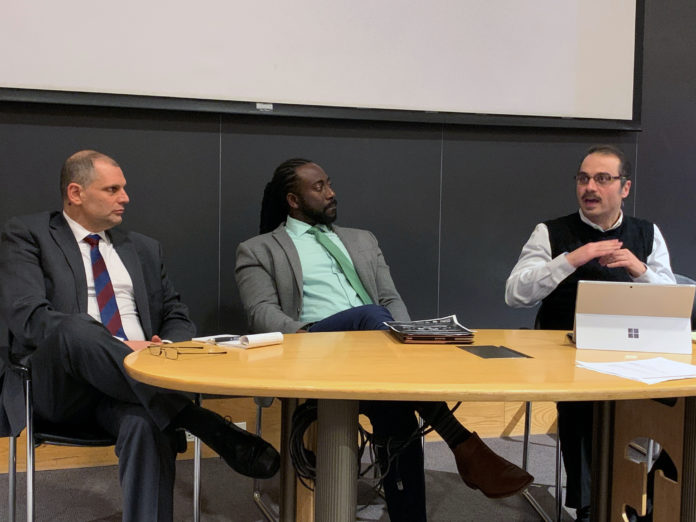CAMBRIDGE, Mass. — Hate speech is protected in the US but there are in fact limits to free speech. Hate speech that incites violence is considered a crime. The tremendous growth in social media has complicated the situation. Social media multiplies the effects of hate speech, and because social media is an anarchic space, it is almost impossible to police.
On December 8, 2019, at Harvard University, the Armenian General Benevolent Union New England District and the National Association for Armenian Studies and Research (NAASR)/Calouste Gulbenkian Foundation Contemporary Armenian Issues Lecture Series jointly sponsored a panel discussion titled “Incitement to Genocide, Freedom of Expression, and Social Media.”
The panel featured Dr. Henry Theriault, associate vice president for Academic Affairs, Worcester State University, who also serves as the president of the International Association of Genocide Scholars; Dr. Jermaine McCalpin, assistant professor and chair of the African and African-American Studies Program at New Jersey City University, an internationally recognized expert and consultant on transitional justice, genocides and reparations; and Dr. Ohannes Kılıçdagı, who recently completed a postdoctoral fellowship at the Center for Middle Eastern Studies at Harvard University and currently serves as the coordinator of the Krikor Guerguerian Online Archive Project at the Strassler Center for Holocaust and Genocide Studies at Clark University. The panel was introduced and moderated by Marc Mamigonian, director of Academic Affairs at NAASR.
Ara Balikian, chairman of the AGBU New England District, opened the evening by explaining that the program was an initiative of the AGBU to mark the International Day of Commemoration and Dignity of the Victims of the Crime of Genocide and of the Prevention of this Crime on December 9. He turned things over to Mamigonian who introduced the speakers and outlined the parameters of the discussion.
The first speaker, Theriault, focused on the direct connection between hate speech and genocide. Noting that genocide denial is itself a form of hate speech, Theriault invoked Israel Charny who has written that denial mocks victims and celebrates their destruction. Incitement is an action through hate speech. Often incitement is subtle and seen as protected speech. Hate speech changes the ethical standards by which decisions to act are made, making violence more likely.
Theriault explained that hate speech in liberal democracies is usually considered protected speech, based on the “Harm Principle.” This principle holds that speech can only be punished if it directly causes material damage and can only be prevented if it will be directly responsible for violence. However, he observed, those using hate speech but not doing direct violence are still part of the process resulting in genocidal violence and should be held accountable. Furthermore, even after genocidal violence ends, denial as a form of hate speech still does material harm.








